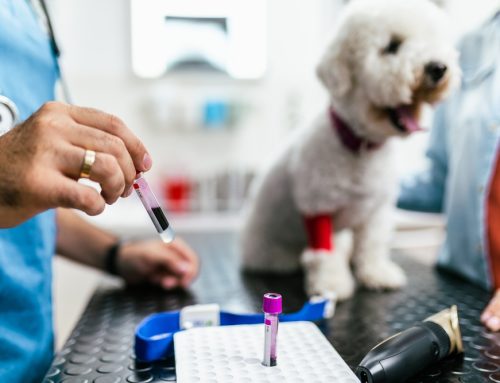Regular wellness screenings can protect your pet from disease, and increase their chance to live a long, healthy life. A veterinary professional’s annual evaluation is a vital part of your pet’s health care plan. Our team at Marcy Veterinary Clinic wants to provide information about regular wellness screenings and highlight the importance of these evaluations.
Your pet’s weight will be monitored during a regular wellness screening
Obesity in pets is a prevalent problem, and the excess weight can cause significant health issues. Obese pets are at higher risk for certain cancers, osteoarthritis, diabetes, and kidney disease. A veterinary professional’s evaluation of your pet’s weight is the best way to properly assess their weight status. In addition to weighing your pet, the veterinarian will assess their body conditioning score (BCS), and the combination of these values is the best determination whether your pet is at an ideal weight. If your pet does need to lose a few pounds, our veterinary professionals will determine an appropriate and safe weight loss program for your pet.
Your pet will be thoroughly examined during a regular wellness screening
A thorough physical examination is part of a wellness screening. Closely evaluating every part of your pet can detect many serious issues.
- Eyes — Conditions such as cataracts, glaucoma, and dry eye may not be evident without close evaluation, but can be detected during a physical examination. In addition, brachycephalic breeds, such as pugs, bulldogs, and Persian cats, frequently develop concerning eye problems that can be detected on a physical exam.
- Ears — Ear infections are common in pets, and can cause your pet significant problems, including hearing loss, if left untreated. In addition, mites and ticks can be found deep inside your pet’s ears during a physical examination. These parasites can lead to serious issues and transmit dangerous diseases.
- Mouth — Most pets older than 3 years have some degree of dental disease, and the bacteria that cause this issue can have serious consequences, including loose teeth, bone deterioration, and organ damage. If dental disease is evident during a physical examination, a professional veterinary dental cleaning may be recommended.
- Skin — Conditions such as dry, flaky skin, itchy skin, and hair loss can indicate issues including endocrine disorders, poor nutrition, allergies, and skin infections.
- Heart and lungs — Your pet’s chest is carefully auscultated during a physical examination, and heart murmurs and arrhythmias, which may indicate heart disease, can be detected. In addition, abnormal lung noises, such as wheezes and crackles, may be appreciated, indicating further testing is needed.
- Abdomen — Your pet’s abdomen is palpated to assess organ size and ensure no masses are present.
- Limbs and joints — Your pet’s gait is assessed to ensure they are not limping or walking stiffly. Their limbs and joints will be palpated and manipulated, to test for any evidence of osteoarthritis, which affects numerous pets and leads to serious pain and mobility issues.
Your pet will have blood work performed during a regular wellness screening
Blood work is an important aspect of a regular wellness check, because not all conditions can be detected on a physical examination. Common blood tests include:
- Complete blood count (CBC) — A CBC evaluates your pet’s white and red blood cells, as well as their platelets. Blood conditions such as anemia, infection, and bone marrow dysfunction can be detected on a CBC.
- Biochemistry profile — A biochemistry profile evaluates your pet’s electrolytes, as well as the health of several organs. Conditions such as kidney disease, liver disease, and diabetes can be detected on a biochemistry profile.
- Heartworm test — Heartworms are a dangerous parasite that can significantly damage your pet’s heart and lungs, and your pet should be tested once a year to ensure they are clear.
- Thyroid test — Senior pets are at higher risk for thyroid disease, and if your pet is more than 6 years of age, a thyroid test may be recommended.
Your pet will have other diagnostics performed during a regular wellness screening
Other diagnostics may be necessary if your pet’s physical exam or blood work detect a problem. More tests are commonly performed during a regular wellness screening, include:
- Urinalysis — Your pet’s urine will be evaluated, assessing the concentration, pH level, and presence of different cell types and crystals. Conditions such as diabetes, urinary tract infection, and kidney dysfunction can be detected on a urinalysis.
- Fecal check — Gastrointestinal parasites are a common problem in pets, and your pet’s feces will be evaluated to ensure they aren’t affected.
Your senior pet needs more frequent wellness screenings

Most pets are considered senior when they reach about 7 years of age, depending on their breed, and senior pets are at higher risk for several diseases. Diagnosing these conditions in the early stages makes treatment and management easier, and typically provides a better prognosis for your senior pet. Once your pet reaches 7 years of age, they should be seen by a veterinary professional every six months, to ensure that no disease process is affecting their health.
Ensure your pet receives regular wellness screenings to keep them healthy, and help prolong their life. If you would like to schedule a wellness screening for your pet, contact our team at Marcy Veterinary Clinic, so we can check them from nose to tail.








Leave A Comment